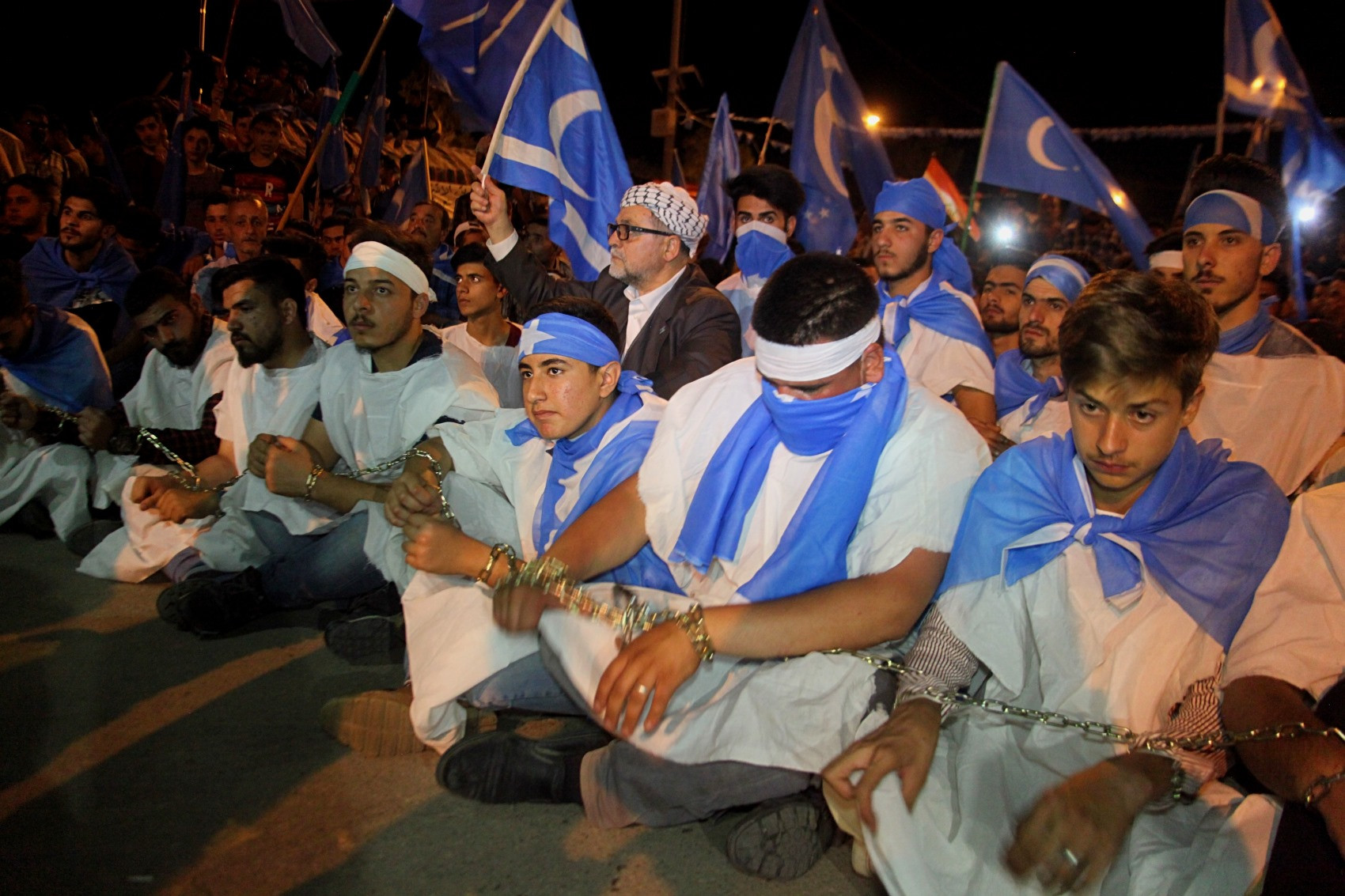The leading Arab and Turkmen parties in Kirkuk denounce recent security coordination between Iraqi and Kurdish forces and the return of Kurdish Peshmerga to Kirkuk, insisting Baghdad to hold a tight grip over Kirkuk security.
The rebuttal is sparked by recent security cooperation between Baghdad and Erbil and the opening of bases for joint coordination centers in Kirkuk, Nineveh and Diyala for exchange of information about the so-called Islamic State in Iraq and Syria.
Hatam Al-Ta'i, spokesperson for the Arab Alliance, an umbrella for Arab parties and figures in Kirkuk among them the current acting governor of Kirkuk Rakan al-Jibouri, hailed Baghdad efforts for restoring security in Kirkuk.
"Yet we reject in all means involvement of other forces except the federal ones in the security of the city, in particular the Peshmerga."
Al-Ta'i denounced putting Kirkuk joint coordination center in office.
"How a security role can be given to the Pehsmerga, a force accountable of destruction of 138 Arab villages and capture of hundreds of our missing people?"
He insisted that achievements of October 16th, 2017, ousting the Kurdish parties and the Peshmerga from Kirkuk by Iraqi forces, to be preserved.
The Iraqi parliament has assigned the federal troops the task of Kirkuk security, he added.
On May 23rd, a group of Kurdish Peshmerga officers were back to Kirkuk to represent the Kurdish Regional government KRG in the joint coordination center in K1 military base northwest of the city.
The Kurdish Peshmerga controlling Kirkuk since 2003 when Saddam Hussein regime was toppled, have marched toward the disputed territories following retreat of Iraqi forces in the face of IS militants in 2014.
The Iraqi government have announced the defeat of IS in 2017 and implemented law enforcement operation to retake control of the disputed territories in response to a referendum for independence by the Kurds, pushing the Peshmerga back to its bases ahead of 2014.

Kirkuk May 2018- Demonstration by the supporters of Turkmen parties against results of 2018 Parliamentary election. Photo for KirkukNow.
The Turkmen community is not only concerned about security, but also upcoming elections as they believe the return of the Kurdish parties leads to fraud in the elections alike in 2018.
"We don't want and disagree about the return of the Peshmerga and the Asayish to Kirkuk as we are heading to elections and they are accused of fraud," said Mohammed Sam'an, spokesperson of the Iraqi Turkmen Front ITF.
The Kurds were accused of forgery yet the investigations could not prove the allegations by the Arabs and the Turkmen.
Sam'an reaffirms that Arab view that Kirkuk is to be run by the federal government.
"Now security is under control and the fight against terror can't be used as an excuse for political achievements at the expense of Kirkuk," he added.
Turkmen, the third largest ethnic group in Iraq after Arabs and Kurds, are spread across the country, residing almost exclusively in the northern towns and villages stretching from Tal Afar through Mosul, Erbil, Altun Kopri, Kirkuk, Tuz Khurmatu, Kifri and Khanaqin. They are all Muslims, half Sunnis and half Shiites.
Turkmen political parties won eight seats out of 329 in Iraq's May 2018 parliamentary elections. ITF holds three seats, and the Turkmen Bloc has five seats.
Kirkuk 2020- An operation by the Peshmerga in the area of Sheikh Bizeny, Kirkuk. Photo by Karwan Salihi.
The Turkmen do not reject of Baghdad and Erbil coordination at the oustkirts of Kirkuk. "If they come in town, then it is violation of the orders of Iraqi parliament," Sam'an said.
Following the Kurdish referendum in 2017, Iraqi parliament has ordered the Iraqi forces to overtake the security of Kirkuk and the disputed territories.
According to the Iraqi constitution, the Federal and the regional government can jointly run the disputed territories.
The disputed territories extend from Khanaqin in the east on the border with Iran to the oil rich city of Kirkuk heading to the west of Mosul in Shingal, home to Ezidi ethno-religious minority, on the border with Syria.
The joint coordination centers were opened in Khanaqin and Makhmour and two others to follow in the disputed territories.
On May 20, the Iraqi troops commenced a 3-day operation in Kirkuk rural areas to eradicate remnants of the so-called Islamic State in Iraq and Syria ISIS whom pose an eminent threat to security and stability in the region in the last couple of months.
The operation followed a series of deadly attacks by the extremist militants in the towns of Daquq, Hawija and Pirdy of Kirkuk in April and May.
The centers are tasked to share intelligence information about Daesh moves, said Major General Tahsin Al-Khafaji, spokesperson of joint operations' command. “To curb smuggling and waste of the country resources, joint operation to be launched soon in the disputed territories, particularly in the areas of security gaps.”
Major General Yehia Rasool, spokesperson of commander-in-chief said on Monday the joint coordination centers between the forces of the federal government & the regional guards (Peshemrga) are important.
"Their duty is sharing information about Daesh terrorist gangs. Peshemrga forces have not carried out any moves from the territories controlled by the federal government," he added.
Acting governor of Kirkuk Rakan Al-Jiburi said in a press conference on May 2nd violent acts escalated by Daesh in Kirkuk due to security gap between Iraqi forces and the Peshmerga.
Currently, Iraqi army, local and federal police along with PMF are under Kirkuk joint operations’ command, an umbrella for security forces running the security of Kirkuk.
The northern oil-rich city of Kirkuk, Iraq's second largest oil reserves, is ethnically a mixed province of 1.2 million Kurds, Arabs, and Turkmen. It has long been at the center of disputes between Baghdad and the autonomous Kurdistan Regional Government KRG.




